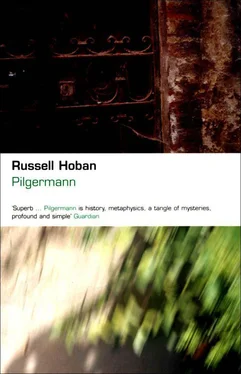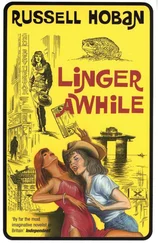Russell Hoban - Pilgermann
Здесь есть возможность читать онлайн «Russell Hoban - Pilgermann» весь текст электронной книги совершенно бесплатно (целиком полную версию без сокращений). В некоторых случаях можно слушать аудио, скачать через торрент в формате fb2 и присутствует краткое содержание. Год выпуска: 2002, Издательство: Bloomsbury Publishing PLC, Жанр: Современная проза, на английском языке. Описание произведения, (предисловие) а так же отзывы посетителей доступны на портале библиотеки ЛибКат.
- Название:Pilgermann
- Автор:
- Издательство:Bloomsbury Publishing PLC
- Жанр:
- Год:2002
- ISBN:нет данных
- Рейтинг книги:5 / 5. Голосов: 1
-
Избранное:Добавить в избранное
- Отзывы:
-
Ваша оценка:
- 100
- 1
- 2
- 3
- 4
- 5
Pilgermann: краткое содержание, описание и аннотация
Предлагаем к чтению аннотацию, описание, краткое содержание или предисловие (зависит от того, что написал сам автор книги «Pilgermann»). Если вы не нашли необходимую информацию о книге — напишите в комментариях, мы постараемся отыскать её.
Pilgermann — читать онлайн бесплатно полную книгу (весь текст) целиком
Ниже представлен текст книги, разбитый по страницам. Система сохранения места последней прочитанной страницы, позволяет с удобством читать онлайн бесплатно книгу «Pilgermann», без необходимости каждый раз заново искать на чём Вы остановились. Поставьте закладку, и сможете в любой момент перейти на страницу, на которой закончили чтение.
Интервал:
Закладка:
On some plane of virtuality the Temple stands, the Jews of A.D. 70 sing and dance while the scholars among them ponder God’s choices. God is a scientist. He knows everything and, having all the time there is, he demonstrates everything including his actual non-presence. Names colour actualities; forget the names Jew and Christian, call them X and Y. Let X be those who said, ‘The blood of him on us and on the children of us.’ Let Y be those who sometimes call that to mind when killing X. What is being demonstrated? X is being demonstrated as victim, Y as avenger. X’s action as victim shows us something of X’s character;xsxsxsx Y’s action as avenger shows us something of Y’s character. Will Y, red of hand with the blood of X through the centuries, ever say, ‘The blood of them on us and on the children of us’? It’s a matter provocative of thought.
A matter provocative of thought, and new approaches continually offer themselves. For example: God being omnipresent is therefore everywhere at once in what is called time; all slaughter of X is therefore in his awareness simultaneously with the birth of him whose death the slaughter avenges. Might it even be possible that God, in his Hebrew aspect writing from right to left, writes first the slaughter of X and later the crucifixion for which they are slaughtered? If we look at it in that way we might see the slaughter as cause and the crucifixion as effect: the sin of the slaughter being heavy on the sinners, there comes the redeemer to offer his innocence for their guilt, the one for the many. As Pontius Pilate washes his hands X is heard to say (by an evangelist writing some four decades later), ‘The blood of him on us and on the children of us’, quite accurately predicting that they, X, will be held accountable for the death of that one who gave his life in expiation of the sins committed and yet to be committed against them, X. The purist may argue that God, being everywhere in time at once, would not have written one thing ‘before’ and another ‘after’ but that argument is well answered when we point out that the Creator characteristically employs a sequential mode of presentation, even going so far as to work six days one after the other and rest on the seventh.
One seeks, as far as possible, reasonable explanations, but here, speaking as waves and particles freely ranging through what is called time, speaking as a witness to what has been done to six million or so X not so very far from here in what is called time, I must say, though lightning strike me as I speak, that there are moments when I begin to wonder whether God really is omniscient; I begin to think that it may be with him even as with some lowly mortal novelist who, having written a tremendous later scene, must perforce go back to insert an earlier one to account for it. Here of course I’m being arrogant, and maybe that’s why God keeps writing slaughter scenes: the character gets out of hand; X, having been called the chosen, presumes too much, grows excessively familiar, requires too much of God, becomes like the relative who turns up uninvited on the doorstep to stay for a month. Maybe it’s that simple — God is omnipresent but not omnipatient. He sometimes needs to make a little space around himself and Pfft! there go a few hundred or a few million X. Ah! to be an X, even to be the drifting waves and particles of an X long defunct, is to be not only arrogant but more than half mad. No matter.
I am the resurrection and the life,
saith the Lord …
So presumably there will always be action of one kind or another, some of us moving in flesh and blood, some of us in waves and particles.
I return now to my flesh-and-blood days. Being now strong enough to travel I prepare to go. I sell all my possessions except my books; my books I give away, I keep only my Holy Scriptures. How shall I dress for my pilgrimage? Not as a Jew, certainly. For the first time in my life I can travel incognito, nobody can prove that I’m a Jew. A wildness comes over me, a giddy sense of freedom. At the same time I think: What have I to live for? It’s as if I am at once walking on very thin ice and drowning in the black water beneath. The Bath Kol then speaks to me for the second time. The same words: ‘Thou pilgrim Jew!’ These words I accept as an answer. Ah! the scent of Sophia in that daughter of a voice!
I dress as did the tax-collector: I put on a long coarse woollen tunic, woollen hose, stout boots. I have an ash staff shod and tipped with iron; a dagger with a Damascus blade; a good thick woollen cloak with my spare underclothes and surgical instruments in a satchel slung on my back; in my scrip bread and cheese and apples; sausages too, I don’t intend to be a kosher pilgrim; fifty gold besants in my purse, three hundred more sewn into a special compartment in my satchel; the same amount in diamonds sewn into the hem of my cloak.
I have no debts to pay; I make my farewells. And Sophia? Our hello and our goodbye will be for all time together in that one time we have been together; such as I am I will not climb that ladder again; I will not intrude upon that altar where I cannot offer. The Shechinah was present in our holy sinning, I know that; nothing can be added to it, nothing can be taken from it. All the same, when I leave the town that night I take my way past the great dark house in the Keinjudenstrasse. I look up at that grouping of the lower stars of the Virgin and those three stars between the Virgin and the Lion, that gesture like a hand flung up: What! will you block the road for ever?
I move on.
6
So. Wherefore is this night distinguished from all other nights? It isn’t. The barking of a dog, the cry of an owl, the distant burning of the stars, these are of every night. The departure? Also every night. Every night the departure softly closes the door of the house behind it and puts its foot to the dark road; there is a continual walking into the dark on the road away. Other nights I have lain in my bed; tonight I hear my footsteps on the road, tonight I put my feet into my footsteps and I go.
Night, night, night. The owl is the Jew-bird, I have been told. Because we are called the children of darkness. Why children of darkness? Because we clung to the so-called night of our old belief, we turned away in A.D. 30 from the new dawn of Jesus Christ. And who should know better than I that A.D. 30 is, along with everything else, the present moment. It’s all here and now, you can choose whatever line you like to follow through the space that is called time. Virtualities and actualities both. Look, here’s a virtual time-line entangled with the others. What does it say on it? ROMANS. Very good, I’ll follow it a little way, see where it goes. It looks quite interesting, things are altogether turned round: Rome is governed by Jews, Rome is an outpost of the far-flung Jewish Empire.
Rome with a Jewish governor! Maybe it’s Jairus, the father of that Eleazar who on another time-line commanded the Sicarii against the Romans at Masada. But on this time-line Masada won’t be happening, and in A.D. 30 Jairus is Governor of Rome. So they bring before him this fellow Jesus, he’s a wandering preacher from Arezzo or some place up in the hills. He’s been getting the people all stirred up with his teaching and his miracles, he’s been worrying senators and priests and officialdom in general, they don’t know what he might bring down on their heads and they think it would be much better for everybody if he could simply be got out of the way. Mind you, he’s no Jew, this Jesus; he’s an uncircumcised Italian, he’s one of theirs but they want no part of him, he’s too dangerous. When Jairus says to them, ‘What then may I do to Jesus called Christ?’ the assembled senators, officials, priests, and hangers-on all say, ‘Let him be crucified.’ Jairus is willing to let the Romans sort things out in their own way. He washes his hands before the crowd, he says, ‘Innocent am I from the blood of this man; ye will see to it.’ And the assembled Romans say, ‘On his own head let the blood of him be.’ I listen and I listen but no one says, ‘The blood of him on us and on the children of us.’
Читать дальшеИнтервал:
Закладка:
Похожие книги на «Pilgermann»
Представляем Вашему вниманию похожие книги на «Pilgermann» списком для выбора. Мы отобрали схожую по названию и смыслу литературу в надежде предоставить читателям больше вариантов отыскать новые, интересные, ещё непрочитанные произведения.
Обсуждение, отзывы о книге «Pilgermann» и просто собственные мнения читателей. Оставьте ваши комментарии, напишите, что Вы думаете о произведении, его смысле или главных героях. Укажите что конкретно понравилось, а что нет, и почему Вы так считаете.












